The First Digital Nation
As a result of the pandemic, many students were given laptops to allow them greater virtual access.
February 15, 2023
With global warming, there have been predictions and precautions all around the world around which nations are to be submerged in the future with the melting of polar ice caps, causing sea levels to rise around the world. Places like Venice in Italy, Amsterdam in the Netherlands, New Orleans in the U.S, and Ho Chi Minh City in Vietnam are all more known places prone to eventually being submerged in the future. There is however, a more unknown nation under British commonwealth known as Tuvalu, a small, thinly populated set of 9 atolls and reef islands in between Hawaii and Australia. Unlike Venice, Amsterdam, New Orleans, and Ho Chi Minh City, which are predicted to last till the 2100s, Tuvalu has a unique approach on the matter. They plan to become a digital nation to salvage Tuvalu’s land, people, nature, culture, and history, and continue the independence that the nation first obtained from Britain on October 1st, 1978.
What does it mean to become a digital nation? Tuvalu’s foreign minister, Simone Kofe, announced that they will become digitized in the metaverse, a 3D virtual space where humans can experience life in ways they could not in the physical world. Through this plan, they will build a scale replica of Tuvalu for people to explore and explore Tuvalu’s culture, nature, and history. As of now, they have started to create the digital replica of Tuvalu and are in the process of moving their administrative and governance systems online. So although Tuvalu will in the future no longer exist in a traditional sense of a physical nation, they have at least found an alternative to ensure that Tuvalu does not cease to exist from a physical plane that humans can visit.
This poses the question of will this a potential viable form to preserve nations in the future when disasters occur? Will it lay the foundation for other nations to follow in the example of Tuvalu or will this potentially be a disastrous idea that will flop or give rise to some new form of dystopian society? There are many questions that have come up with this proposition from Tuvalu’s foreign minister but all we could do is see where this interesting idea will head in the future. As Kofe himself has stated, “We have no choice but to become the world’s first digital nation … Only global effort can ensure that Tuvalu does not move permanently online and disappear forever from the physical plane.”
The age of technology is truly changing how we humans look at life and issues.







